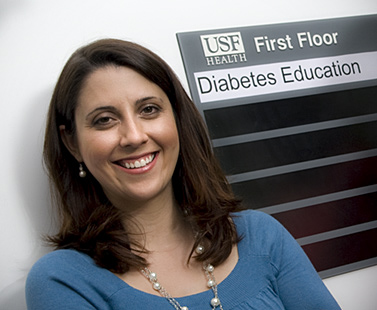New faculty member helps patients understand diabetes
When people are first diagnosed with diabetes, they may get depressed. Or anxious. Or angry.
New USF faculty member Laura Williams, PhD, knows this better than most.

Dr. Laura Williams, USF clinical psychologist and assistant professor of pediatrics, hands out beads at the Gasparilla Children’s Parade.
As a clinical psychologist who specializes in treating people with diabetes, Dr. Williams works to help people understand those problems – and realize just how normal they are.
Her empathy goes beyond her training. Dr. Williams was diagnosed with type 1 diabetes herself when she was 21. In a way, Dr. Williams says, the diagnosis was easier for her. Her mother, suspicious of her daughter’s constant thirst, did a blood test herself. And Dr. Williams’ grandmother also has type 1 diabetes, so it wasn’t a scary unknown.
The flip side of familiarity: she knew that diabetes would affect her life each and every day. She was anxious about whether she would be able to manage: What would she eat? Could she control her blood sugar? How often would she have to inject insulin?
“I was very needle-phobic,” Dr. Williams recalled with a smile.
Now 30, those fears are just a memory. She wears an insulin pump and copes with her own anxieties by helping others face theirs.
Dr. Laura Williams has joined the Diabetes Education Center at USF Health.
Often, the hardest step is just getting diabetes patients to realize that seeing a psychologist could help.
“I think people often have the misconception that psychologists only work with people who have severe psychological disorders,” Dr. Williams said. “I do work with people who have severe depression or anxiety, but a big part of what I do is helping people cope with fitting diabetes care into everyday life.”
That’s why Dr. Williams has come to USF. Dr. Williams, who recently completed a fellowship and internship at Cincinnati Children’s Hospital, is a North Carolina native who studied at the University of North Carolina and the University of Florida.
Dr. Williams will play a key role in USF Health’s efforts to expand its Diabetes Education Center, dedicated to giving diabetes patients the knowledge and tools they need to manage the disease.
“Dr. Williams is the perfect first addition to the center,” said Nicole Johnson, the center’s director of education, communication and outreach. “She brings a warmth, sensitivity and personality that is bright and encouraging. Her own challenge with diabetes makes her real to others who are living with the disease or grappling with the challenges diabetes throw toward us.”
And diabetes can be challenging, said Dr. Williams, an assistant professor of pediatrics. Patients have to think about a chronic disease all day, every day. That can be hard to cope with, setting the stage for individual battles with depression, anger and anxiety as well as family conflict.
Part of the problem, Dr. Williams said, is that controlling diabetes is different for everyone.
“People with diabetes can do all the things they’re supposed to do for their condition, and their control can still not be be where they want it to be,” she said. “That can be very frustrating.”
The constant attention to a number — the patient’s A1C number, or average blood sugar level over time — can make children, in particular, feel as if they are being evaluated or graded. They may feel as if they’re being labeled as “bad” or “good,” based on their latest number.
“It can set them up for failure,” Dr. Williams said. “Children with diabetes often worry that their parents will yell at them, question them, or become upset with their numbers.”
The problem of not knowing why a patient is having problems with control can make it difficult for families. If a teen’s diabetes isn’t well-controlled, is it because the teen isn’t following diabetes guidelines? Or are parents blaming a teenager who’s trying to do everything right?
“Teens in particular find diabetes challenging,” Dr. Williams said. “They have other things in their lives, like friends and school, that are important to them. Diabetes isn’t always at the top of their list. And that can lead to conflicts with their parents about the importance of their diabetes care.”
Sometimes, Dr. Williams said, it’s hard for patients to just keep going.
“The other thing I hear from people with diabetes is that they experience burnout,” she said. “They get tired of dealing with diabetes every single day.”
Parents can have issues too. They have to cope with their own anxieties and fears about a child’s future complications or blood sugar lows.

Laura Williams and Nicole Johnson show off their insulin pumps.
Johnson said she knows Dr. Williams can help people find an answer to some of those issues.
“She gives people comfort that it is OK to be irritated at diabetes,” Johnson said. “But it is not OK to give in to the condition.”
Sometimes, concrete solutions are possible. For instance, the whole family may rest better at night if a child has a continuous glucose monitor with an alarm that warns of lows.
Others take longer to develop. As children get older and become more independent, they do more to monitor and care for their diabetes. But Dr. Williams warns this is a gradual process. It doesn’t happen overnight, and it can be difficult for parents to let go, as well as for teens to develop responsible habits.
“That transition process can be a very difficult period of time for both teens and parents,” she said.
Both Johnson and Dr. Williams hope the Diabetes Education Center can do more to help teens and young adults transition to caring for their diabetes themselves. The center is developing a transition program that will help young people and their families navigate these challenges.
In the meantime, Dr. Williams advises teens and young adults to cultivate a strong support group of family and friends who understand the risks of diabetes.
“The people I work with who cope well with diabetes,” she said, “are those who are open about their diabetes with friends and other important people in their lives.”
Story by Lisa Greene, and photos by Eric Younghans; USF Health Communications
RELATED STORIES:
– Dreaming up a Diabetes Center
– Living with Diabetes: One Teen’s Story
– Back at USF, Former Miss America Advocates Diabetes Education


